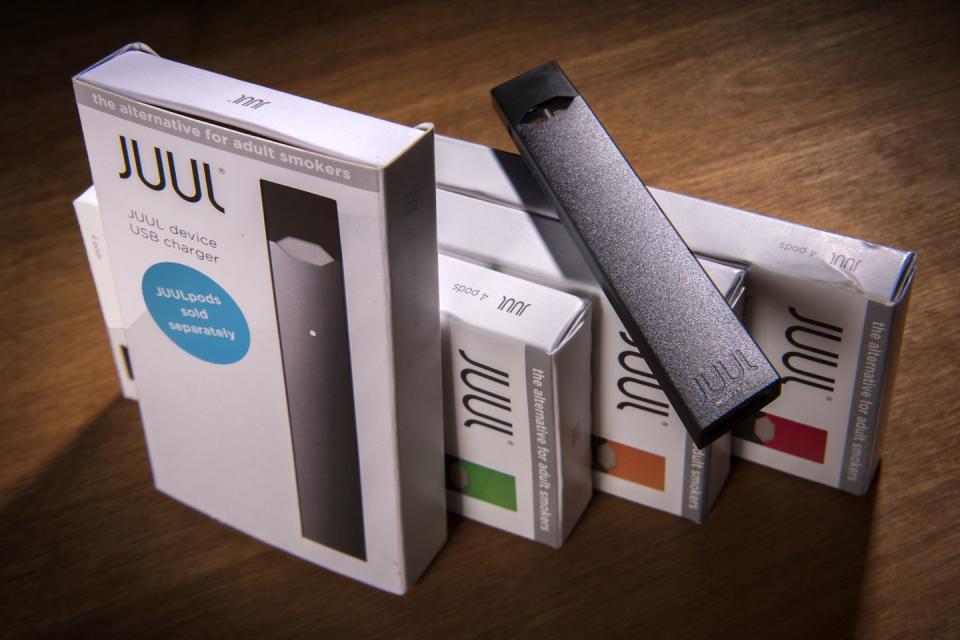Is Juul Safe? The Disturbing Truth About Its Potential Side Effects

With a sleek design, fun flavors, and plenty of posts on social media-more than 240,000 posts tagged as #juul on Instagram, to be exact-it’s easy to see why teens are attracted to Juul. The e-cigarettes are so popular that in less than three years on the market, Juul has grown to represent more than half of the e-cigarette market share, Nielsen data show.
But while users may think Juul poses no risks to their lungs, experts caution that it may open the gates to smoking traditional cigarettes. “While there’s been a significant drop in youth smoking over the last decade, the use of other tobacco products like e-cigarettes, including Juul, in this age group continues to climb,” says Humberto Choi, MD, a pulmonologist at the Cleveland Clinic. “We worry that young people who use e-cigarettes may be more likely to start smoking tobacco.”
In fact, the Food and Drug Administration (FDA) recently issued more than 1,300 warning letters and fines to retailers who illegally sold Juul, as well as other e-cigarettes, to minors. “We see clear signs that youth use of electronic cigarettes has reached an epidemic proportion,” FDA commissioner Scott Gottlieb, MD, said in a statement.
But are e-cigarettes just as dangerous as those we associate with lung cancer? Here’s everything you need to know about Juuling and how it could impact your health.
What is a Juul, exactly?

Juul has two parts and looks a lot like a USB drive. The body has a lithium-ion polymer battery, a temperature regulator, and sensors to read the charge level and to sense inhalation. The pod (which attaches to the body) contains an atomizer, e-liquid, and the mouthpiece.
Like other e-cigarettes, the Juul heats up this e-liquid-which contains nicotine salts, propylene glycol, glycerine, benzoic acid, and flavoring-to create an aerosol. The salts are used to “help satisfy smokers when transitioning from cigarettes,” the official Juul website states, because they deliver a hit of nicotine in a way much like how a cigarette does.
Additionally, the concentration of nicotine is much more potent than other e-liquids on the market. A pod of liquid reportedly has as much nicotine as a pack of cigarettes-and delivers that nicotine 1.25 to 2.7 times faster than other e-cigarettes. However, most 15- to 24-year-olds don’t know that Juul pods always contain nicotine, researchers noted in a 2018 study published in Tobacco Control.
Are there any Juul side effects?
Because the devices are easy to hide and produce less vapor, “you can sit in a classroom, hold it in your hand, blow the vapor up your sleeve, and use these products very intensely,” explains Robin Koval, CEO and president of Truth Initiative, a non-profit public health organization dedicated to stopping the use of tobacco.
What’s more, nicotine is incredibly addictive, so those who start with e-cigs may eventually start smoking regular cigarettes, which research overwhelmingly finds is destructive to the body, according to the U.S. Department of Health and Human Services.
But of the young people who know about Juul, almost half think it’s “a lot” or “a little” less harmful than cigarettes, while only a third think it’s “much” or “slightly more” addictive than cigarettes, according to the Tobacco Control study.
Aside from addiction, the long-term side effects of using Juul are unknown at this time since it’s still a new product and there is limited data on e-cigarette use overall.
“We know that in the short-term, e-cigarettes can cause inflammation in the airways and in the lungs,” Dr. Choi says. “And nicotine is linked to multiple health problems, including increased heart rate, constriction of the blood vessels-which could lead to heart disease-peptic ulcers, erectile dysfunction, premature birth, and sudden infant death syndrome,” Dr. Choi says.
So is Juuling bad for you?
Although Juul is thought to be safer or healthier than cigarettes, there is no long-term evidence to support this, Dr. Choi says. “We know that there are short-term health problems associated with e-cigarettes that are typically caused by the heat in the vapor, acute inflammation caused by the chemicals in the liquid, or nicotine toxicity,” he explains.
Some experts, including Koval, believe Juul may be less harmful than cigarettes, “but remember that regular cigarettes are one of the more deadly products out there,” she adds.
Can Juul cause lung cancer?
Juul doesn’t produce tar, carbon monoxide, or other chemicals associated with combustible tobacco and the risk of lung cancer. However, it’s still unclear if Juul poses any cancer risk.
“We know that the liquids used in these devices do contain known substances associated with lung cancer, such as formaldehyde,” Dr. Choi says. Only time and more research will reveal the exact consequences the current teen generation will face from smoking Juul and other e-cigs.
We do know, however, that the younger a person begins smoking electronic cigarettes, the more likely they are to smoke traditional cigarettes-the leading cause of lung cancer in the U.S. “If this is accelerated by the popularity of Juul, that’s a dangerous thing,” Koval says.
('You Might Also Like',)

